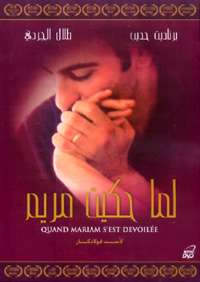When Maryam Spoke Out
| When Maryam Spoke Out | |
|---|---|
 | |
| Directed by | Assad Fouladkar |
| Produced by |
Assad Fouladkar The Lebanese American University |
| Written by | Assad Fouladkar |
| Starring |
Bernadette Hodeib Talal El-Jordi Renée Dik Umaya Lahoud Joseph Abu-Dames Randa Alam |
| Music by | Nidaa Abou Mrad |
| Cinematography | Joseph Chmali |
Release date |
|
Running time | 98 minutes |
| Country | Lebanon |
| Language | Arabic |
When Maryam Spoke Out (Arabic: لمّا حكيت مريم, translit. Lamma hikyit maryam) is a 2001 Lebanese film directed by Assad Fouladkar and based on a true event that happened in Lebanon.
It is a social story about a couple, Ziad and Maryam, who lead a happy marriage, except for the fact that after three years of marriage Maryam has still not had a baby. Her husband Ziad is compassionate and assures her, that he still loves her. Nonetheless, Maryam cannot escape the growing pressure from the family, especially from her mother-in-law. She reacts to it in her own way with a false pregnancy. The initial enthusiasm and care is quickly gone when it becomes clear they are not really expecting a baby.
When Maryam Spoke Out is Fouladkar's first feature film. [1]
Synopsis
After three years of happily married life, Ziyad and Maryam feel the social pressure to have a child. Their previously happy relationship becomes poisoned when it is discovered that Maryam is infertile.
Cast and characters
- Bernadette Hodeib as Maryam
- Talal El-Jordi as Ziyad
- Renée Dik
- Umaya Lahoud
- Joseph Abu-Dames
- Randa Alam
Awards
- Best performance by an actress for Bernadette Hodeib at the sixth Biennale des Cinemas Arabes, 2002, Paris, France.[2]
- Best Film and Best performance by an actress for Bernadette Hodeib at the Carthage Film Festival, 2002, Carthage, Tunisia.[3]
- Best Film and Best performance by an actress for Bernadette Hodeib at the Alexandria Film Festival, Egypt [1]
- Best actress for Bernadette Hodeib, Critics Award and the Golden Dagger for Assad Fouladkar at the Muscat Film Festival, 2003, Amman.[3]